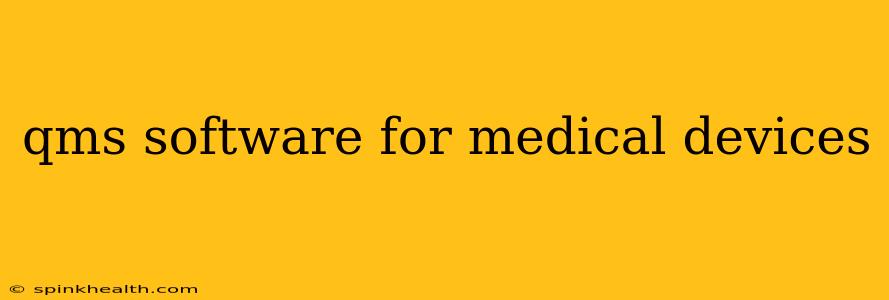The world of medical devices is a complex one, demanding rigorous standards and unwavering commitment to quality. A single faulty component can have devastating consequences. This is where a robust Quality Management System (QMS) becomes not just a regulatory requirement, but a crucial lifeline for manufacturers striving for both compliance and innovation. But navigating the landscape of QMS software specifically designed for medical devices can feel overwhelming. This article will guide you through the key considerations, answering common questions and highlighting the vital role this software plays in ensuring patient safety and business success.
Imagine this: You're a small medical device startup, brimming with innovative ideas for life-saving technology. You're passionate about your product, but the regulatory maze feels insurmountable. The sheer volume of documentation, the complex auditing requirements, and the constant need for traceability—it can all feel paralyzing. This is where a dedicated QMS software steps in, acting as your reliable partner, streamlining operations, and enabling you to focus on what truly matters: improving lives.
What is QMS Software for Medical Devices?
QMS software, tailored for the medical device industry, is a sophisticated system that helps companies manage and document all aspects of their quality management processes. This goes far beyond simple document control; it's about establishing a comprehensive, auditable trail ensuring compliance with stringent regulations like ISO 13485, FDA 21 CFR Part 820, and other relevant global standards. This software typically incorporates features designed to manage:
- Document Control: Version control, approval workflows, and easy retrieval of critical documents are essential.
- CAPA (Corrective and Preventive Action): Efficiently managing and tracking deviations, non-conformances, and corrective actions is crucial for continuous improvement.
- Audits: Scheduling, conducting, and managing internal and external audits becomes streamlined.
- Risk Management: Identifying, analyzing, and mitigating potential risks throughout the product lifecycle is crucial for safety.
- Supplier Management: Managing and tracking supplier performance and compliance is paramount.
- Training: Tracking employee training records and ensuring compliance with necessary qualifications.
- Nonconformance Management: A robust system for tracking and resolving issues related to products and processes.
What are the benefits of using QMS software for medical devices?
The advantages extend far beyond simply meeting regulatory demands. A well-implemented QMS software can:
- Reduce Errors: Streamlined processes and automated workflows minimize human error, improving accuracy and efficiency.
- Improve Efficiency: Automation reduces manual tasks, freeing up valuable time for more strategic initiatives.
- Enhance Collaboration: Centralized access to information improves communication and collaboration across teams.
- Boost Compliance: Ensures adherence to industry regulations, reducing the risk of non-compliance penalties.
- Increase Profitability: By streamlining processes and reducing errors, you can improve efficiency and lower operational costs.
What are the key features to look for in QMS software for medical devices?
Choosing the right software is critical. Consider these key features:
- ISO 13485 Compliance: This is a non-negotiable requirement for most medical device manufacturers.
- FDA 21 CFR Part 820 Compliance: Ensures adherence to US FDA regulations.
- Audit Trails: Complete and secure audit trails are essential for regulatory compliance.
- User-Friendliness: A system that is easy to use and navigate will improve adoption and efficiency.
- Scalability: The software should be able to adapt to your company's growth and evolving needs.
- Integration Capabilities: Seamless integration with other systems, such as ERP and CRM, can enhance efficiency.
How much does QMS software for medical devices cost?
The cost of QMS software varies considerably depending on the size of your company, the features you require, and the vendor you choose. It’s crucial to get detailed quotes from several vendors and compare pricing models (subscription-based vs. one-time purchase).
What are the different types of QMS software for medical devices?
The market offers a range of solutions, from cloud-based platforms to on-premise software. Cloud-based solutions often provide greater flexibility and accessibility, while on-premise systems may offer greater control over data security.
How do I choose the right QMS software for my medical device company?
Selecting the right QMS software is a critical decision. Thoroughly assess your specific needs, consider the features mentioned earlier, and obtain demos from several vendors before making a decision. Look for software that aligns with your company's size, budget, and long-term goals.
The journey toward building a robust and compliant QMS can seem daunting, but with the right software and strategic implementation, it becomes a pathway to success, ensuring patient safety and driving innovation in the vital medical device industry. The investment in a well-chosen QMS is not just a cost, but an investment in the future of your company and the well-being of countless patients.

